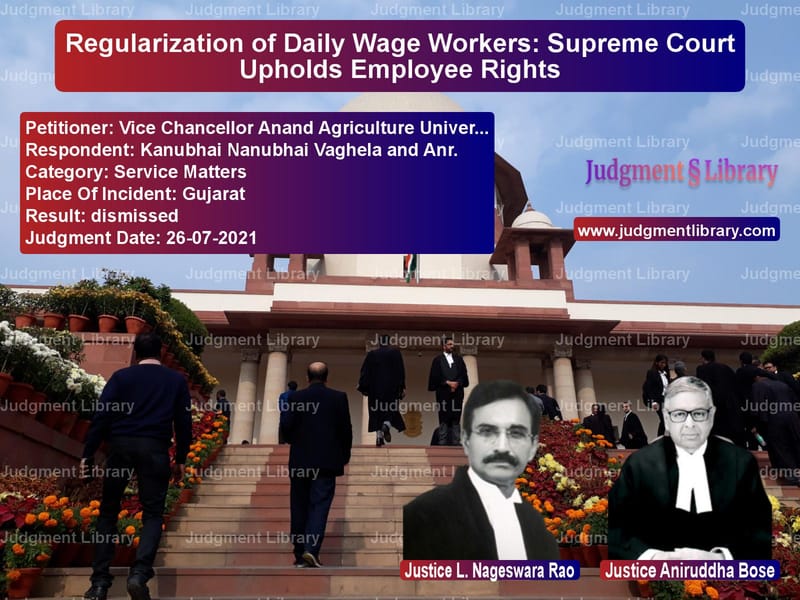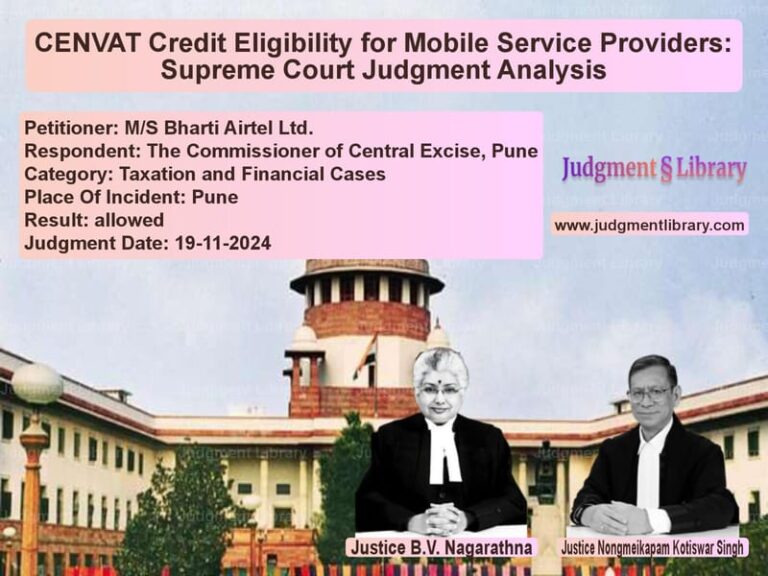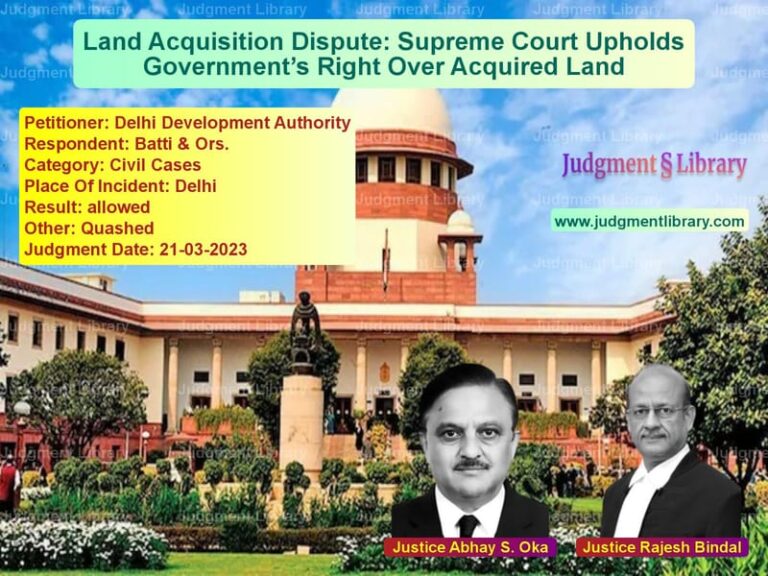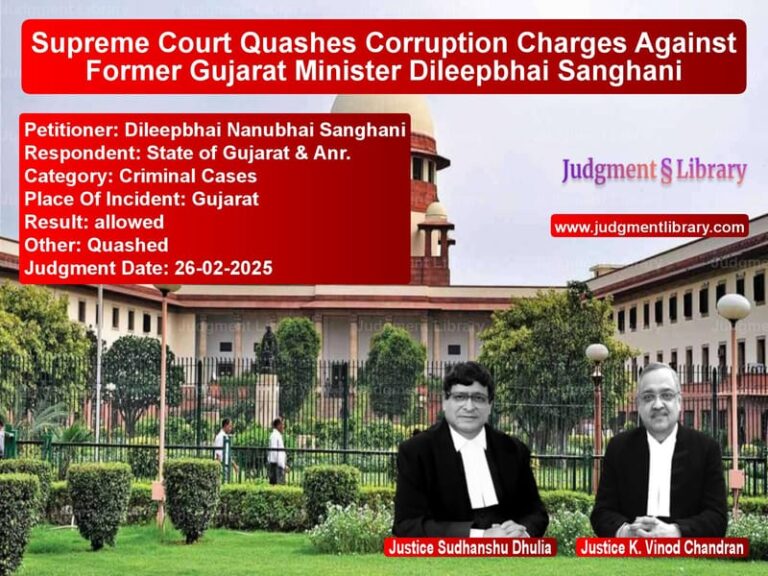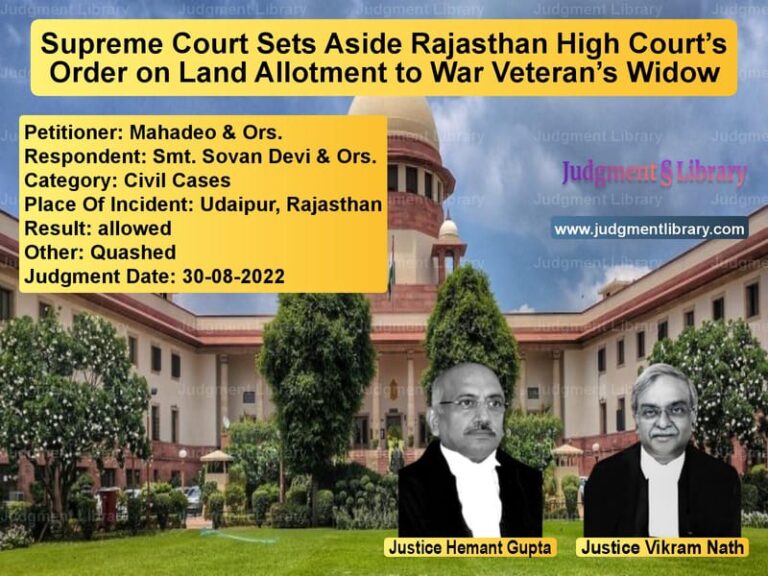Regularization of Daily Wage Workers: Supreme Court Upholds Employee Rights
The Supreme Court of India recently delivered an important judgment on 26th July 2021 in the case of Vice Chancellor Anand Agriculture University v. Kanubhai Nanubhai Vaghela & Anr.. The ruling focused on whether daily wage workers employed by the appellant university were entitled to the regularization of their services. The case carried major implications for contract and daily-wage employees working in government and semi-government institutions.
The judgment, delivered by L. Nageswara Rao and Aniruddha Bose, upheld the rights of the daily wage workers, recognizing their entitlement to permanent employment as per the Gujarat Agricultural University Regularization Scheme. This ruling sets an important precedent regarding the rights of temporary workers who have served for long durations.
Background of the Case
The appellant, Anand Agriculture University, engaged daily wage workers for various roles, including plumbers, carpenters, sweepers, pump operators, helpers, masons, and field laborers. These workers were employed at different agricultural research centers affiliated with the university.
The workers, many of whom had been serving for more than ten years, sought the regularization of their services. They filed an industrial dispute, which was decided in their favor by the Industrial Tribunal, Rajkot. The tribunal directed the university to regularize the services of all daily wage workers who had completed ten years of service as of 1st January 1993 and grant them the pay and benefits of permanent Class IV employees.
The university challenged this decision before the High Court of Gujarat, which modified the tribunal’s order. The High Court ruled that:
- The daily wage workers should receive pay equivalent to the minimum of the pay scale applicable to permanent employees.
- The university must frame a scheme to facilitate the regularization of daily wage workers.
Unhappy with this ruling, the university filed an appeal before the Supreme Court.
Legal Issues Before the Court
- Whether daily wage workers who completed ten years of service were entitled to regularization.
- Whether the Gujarat Agricultural University Regularization Scheme of 2001 applied to the respondents.
- Whether the Supreme Court’s ruling in Secretary, State of Karnataka v. Umadevi & Ors. (2006) restricted the regularization of daily wage workers.
- Whether financial constraints could justify denying permanent employment to workers who had served for years.
Arguments by the Appellant
The appellant, represented by P.S. Patwalia, argued:
- There were no sanctioned posts available for the respondents, and their regularization was legally untenable.
- The judgment in Secretary, State of Karnataka v. Umadevi & Ors. (2006) held that employees could not be regularized unless they had been appointed to sanctioned posts.
- Financial constraints made it difficult for the university to provide permanent employment to all daily wage workers.
- The High Court erred in directing the regularization of the respondents without considering the university’s administrative and financial limitations.
Arguments by the Respondents
The respondents, represented by Nachiketa Joshi, countered:
- The Supreme Court had already approved the Gujarat Agricultural University’s scheme for regularizing daily wage workers in Gujarat Agricultural University v. Rathod Labhu Bechar & Ors. (2001).
- Many of their colleagues had already been regularized under this scheme, and they were being treated unfairly.
- The university’s argument about financial constraints had been rejected earlier, and it could not be used again to deny them their rightful employment status.
- The Umadevi judgment did not apply in their case since the Gujarat Agricultural University Regularization Scheme had already been approved by the Supreme Court.
Supreme Court’s Observations
The Supreme Court made the following key observations:
- The Gujarat Agricultural University Regularization Scheme was formulated and approved by the Supreme Court in 2001, and its implementation was a binding obligation.
- The right of the respondents to be regularized under the scheme could not be negated by citing Umadevi, as the latter ruling applied only to cases where no valid regularization scheme existed.
- The argument of financial constraints was rejected, with the Court stating: “Financial stringency is not a ground to deprive the daily wagers of their right for regularization in accordance to the scheme.”
- The university had already created 890 posts for the absorption of daily wage workers, showing that regularization was not an impossibility.
- The university’s approach of regularizing some workers while denying the same benefit to others was discriminatory.
Final Verdict
The Supreme Court dismissed the university’s appeal and upheld the High Court’s ruling that the respondents were entitled to regularization. The Court ruled:
- The university must treat the respondents as permanent employees from the date they completed ten years of service.
- The respondents should be granted all benefits of permanent employees, including pay, allowances, and other entitlements.
- The university’s financial constraints or lack of sanctioned posts could not be used to deny them their rightful employment status.
- The university must implement the Gujarat Agricultural University Regularization Scheme fairly and without discrimination.
Impact of the Judgment
This ruling has significant implications for contract and daily wage employees across various government and semi-government institutions:
- Strengthening Employee Rights: The decision reinforces the legal rights of long-serving daily wage workers to demand fair treatment.
- Enforcement of Regularization Schemes: Institutions cannot refuse to implement valid schemes that have been approved by the courts.
- Prevention of Discriminatory Practices: The ruling ensures that employers do not selectively regularize employees while denying the same benefits to others.
- Limits of Umadevi Ruling: The judgment clarifies that Umadevi does not override pre-existing legal commitments to employee regularization.
Conclusion
The Supreme Court’s judgment in Vice Chancellor Anand Agriculture University v. Kanubhai Nanubhai Vaghela & Anr. is a landmark ruling that safeguards the rights of daily wage workers. It reaffirms the binding nature of judicially approved regularization schemes and prevents government institutions from exploiting workers by delaying their permanent employment.
By ensuring fair treatment for all employees, this ruling sends a strong message that contract and daily wage workers cannot be left in a perpetual state of job insecurity. It upholds the principle of employment justice and ensures that institutions fulfill their obligations toward their workforce.
Petitioner Name: Vice Chancellor Anand Agriculture University.Respondent Name: Kanubhai Nanubhai Vaghela and Anr..Judgment By: Justice L. Nageswara Rao, Justice Aniruddha Bose.Place Of Incident: Gujarat.Judgment Date: 26-07-2021.
Don’t miss out on the full details! Download the complete judgment in PDF format below and gain valuable insights instantly!
Download Judgment: vice-chancellor-anan-vs-kanubhai-nanubhai-va-supreme-court-of-india-judgment-dated-26-07-2021.pdf
Directly Download Judgment: Directly download this Judgment
See all petitions in Employment Disputes
See all petitions in Public Sector Employees
See all petitions in Termination Cases
See all petitions in Judgment by L. Nageswara Rao
See all petitions in Judgment by Aniruddha Bose
See all petitions in dismissed
See all petitions in supreme court of India judgments July 2021
See all petitions in 2021 judgments
See all posts in Service Matters Category
See all allowed petitions in Service Matters Category
See all Dismissed petitions in Service Matters Category
See all partially allowed petitions in Service Matters Category

